Level up with Copilot Updates: July 2025’s Most Impactful Enhancements
Microsoft 365 Copilot continues to evolve at a rapid pace, and the Copilot updates rolling out during July 2025 are a testament to that momentum. For those already using Copilot in their daily workflows, this month’s enhancements aren’t just incremental—they’re strategic. These updates aren’t just about adding features, they’re about refining the way Copilot integrates into daily workflows, offering more control, smarter context and greater flexibility across the Microsoft 365 suite. From deeper analytics and smarter agents to expanded mobile capabilities, these updates are designed to give power users more control, more context and more value.
Enhanced Visibility: New Copilot Analytics and Reporting Tools
As organizations continue to embed Copilot into their daily workflows, understanding how it’s being used becomes just as important as deploying it. The July 2025 updates to Copilot Analytics reflect this shift, offering leaders and analysts deeper visibility into employee engagement with Microsoft 365 Copilot Chat. New prompt categories, “Ask and find,” “Catch up,” “Draft and brainstorm” and “Other” provide a more structured view of how Copilot is supporting productivity across teams. These insights are now available in the Adoption and Impact tabs of the Copilot Dashboard, with breakdowns by department and group. Additionally, Intelligent Recap metrics have been unified to reflect both summarized and recapped meeting activity, replacing the older “Copilot Assisted Hour” model. This streamlined reporting gives organizations a clearer, more actionable view of Copilot’s impact in Microsoft Teams.
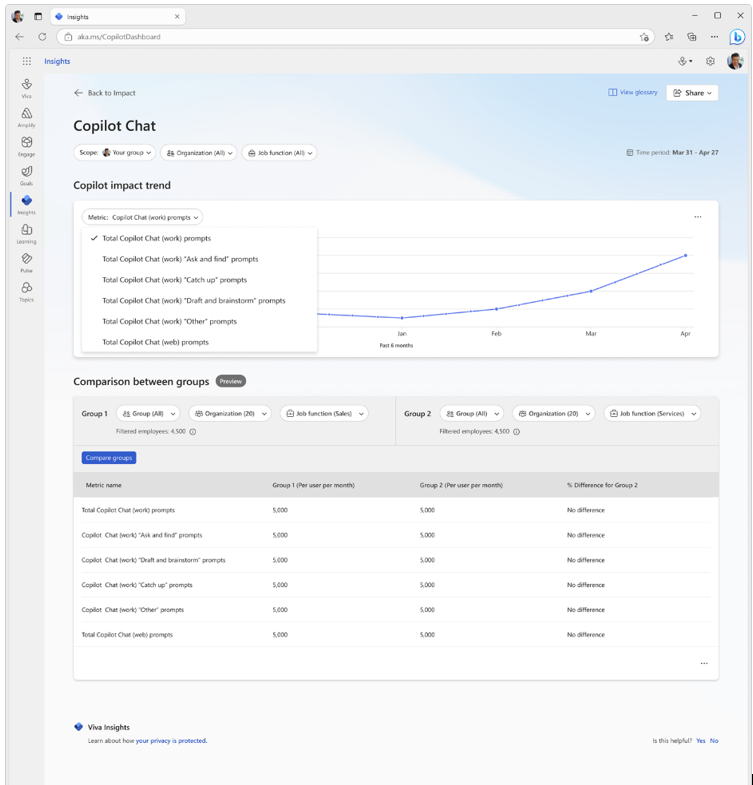
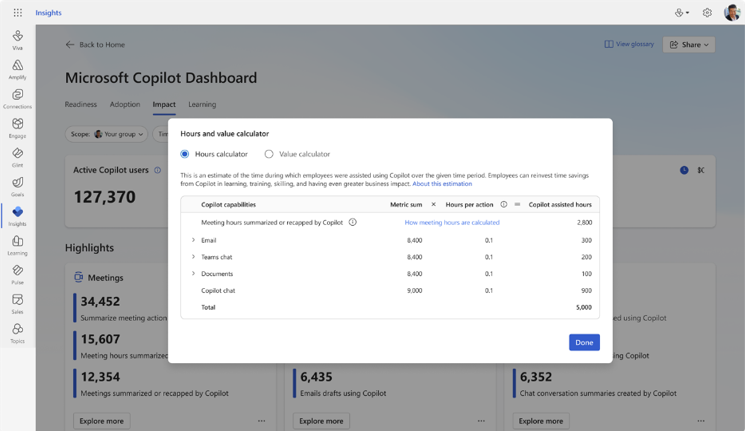
Smarter Governance: Manage Agents and Billing with Better Control
This month’s updates also bring greater visibility and governance over AI agent usage. The new Agents and Connectors view includes rich metadata—such as agent capabilities, knowledge sources, custom actions and certification details—making it easier to manage, approve or block agents at the user or group level.
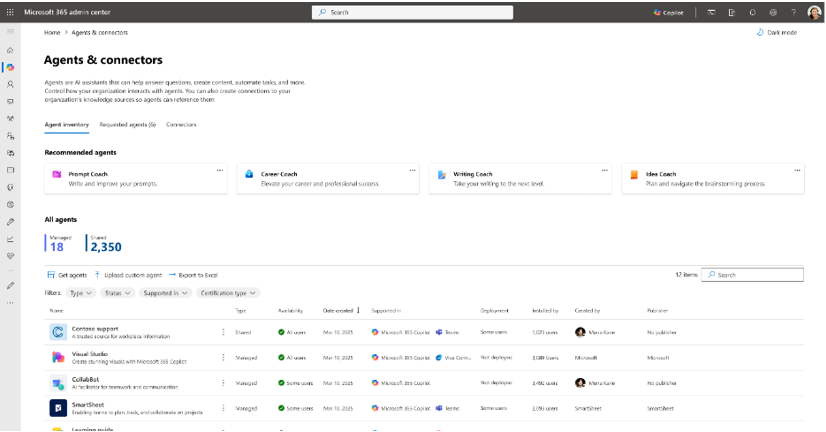
On the financial side, organizations using the pay-as-you-go Microsoft 365 Copilot Chat service can now implement scoped billing policies tied to specific users, groups and Azure subscriptions. These policies support departmental chargebacks and allow for budget limits, reset frequencies and automated alerts, giving finance teams the tools they need to manage Copilot usage with confidence.
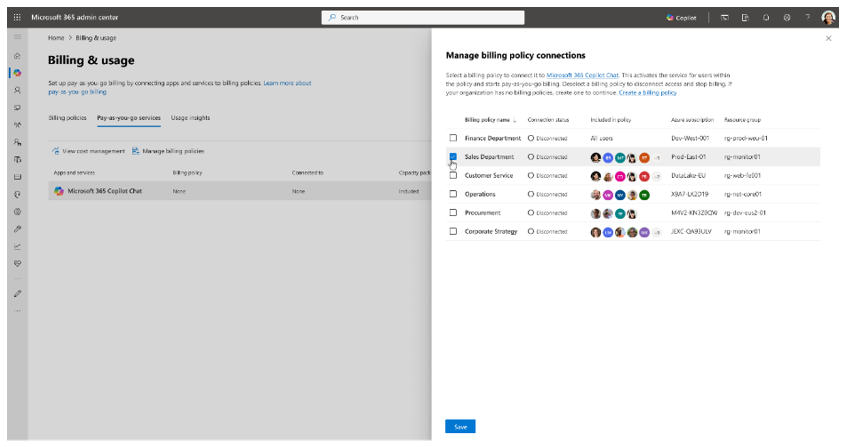
ContextIQ Upgrades: Smarter Prompts with Real-Time Work Context
Microsoft continues to enhance the user experience with Copilot by expanding the capabilities of ContextIQ, its intelligent assistance layer that grounds prompt in real-time work context. Accessible directly within Copilot Chat via the forward slash (/) command or the “Add content” button, ContextIQ allows users to seamlessly attach relevant files, meetings and collaborators to their prompts. This results in more accurate, context-aware responses without the need to manually upload documents.
Notably, ContextIQ now supports third-party data sources through Microsoft Graph Connectors, enabling users to reference systems like Salesforce or ServiceNow directly in their prompts. Even users without a Microsoft 365 Copilot license can benefit from this update, using ContextIQ to search for and attach accessible files from OneDrive or their organization’s shared content. These enhancements make it easier than ever to bring the right context into every Copilot interaction, boosting both precision and productivity.
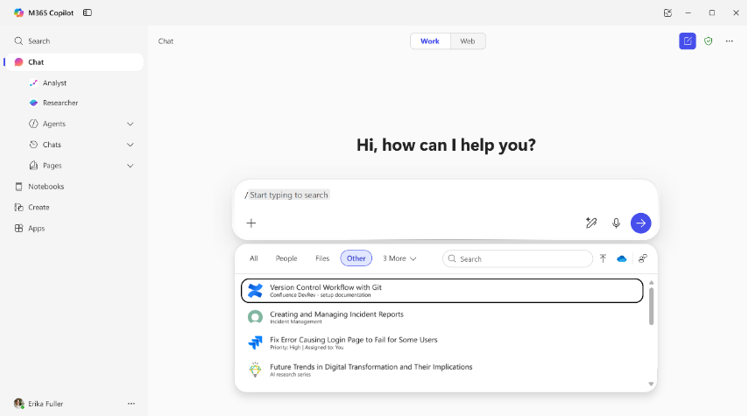
Copilot Memory: Personalized AI That Learns and Adapts
One of the most impactful updates rolling out in July is the introduction of Copilot Memory, a new capability that allows Copilot to remember key details about users to deliver more personalized and efficient support. By capturing meaningful context from conversations, such as preferred tools (“e.g., “I prefer Python for data science”) or communication styles, Copilot can tailor its responses to better align with individual working habits. Users can also set Custom Instructions to define tone, formatting or other preferences that will be applied consistently across interactions. To help Copilot learn faster, users can prompt it with questions like “Ask me 5 questions to learn more about my writing style.” Importantly, memory is fully transparent and user-controlled: individuals can view, edit or delete stored memories at any time, and memory can be turned off entirely. A subtle “memory updated” notification ensures users are always informed. Copilot Memory is enabled by default, with tenant-level controls available for IT administrators to manage deployment across the organization.
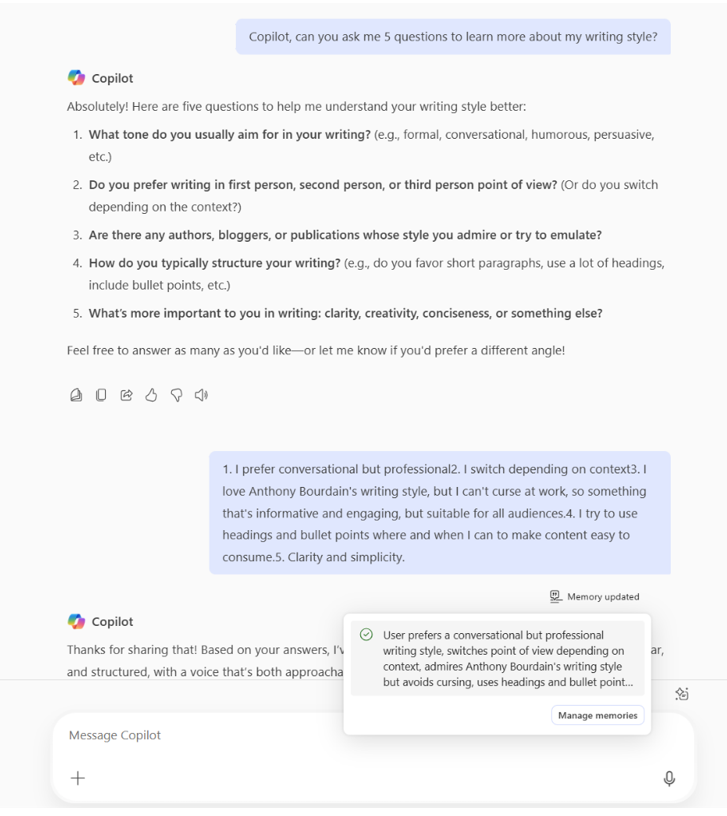
App-Specific Enhancements
Copilot continues to evolve within the Microsoft 365 suite, with July’s updates delivering meaningful improvements to Excel, Outlook and now Microsoft Edge. In Excel, the new Explain Formula feature transforms Copilot into an inline assistant, offering clear, step-by-step breakdowns of formulas directly within the grid. These explanations are grounded in the context of the user’s workbook, helping clarify calculations, references and ranges across sheets, making it easier for users to understand and trust their data.
In Outlook, scheduling meetings becomes more intuitive with natural language capabilities now available in (Microsoft 365) Copilot Chat. Users can propose, refine and finalize meeting details conversationally without navigating complex forms. For those using classic Outlook for Windows, a new sidebar experience brings Copilot Chat into the reading and writing pane, enabling real-time assistance in context. Additionally, Copilot can now summarize PDF, Word and PowerPoint attachments directly from emails, streamlining information access without leaving the inbox.
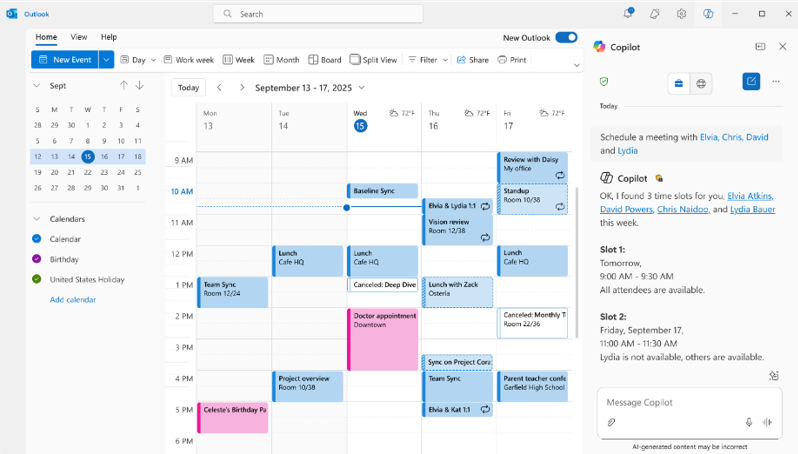
Microsoft Edge also joins the productivity lineup with a new integration that allows users to submit queries directly to Microsoft 365 Copilot from the browser’s address bar. Whether asking how to create a pivot table or requesting help with a document, users can receive detailed, contextual responses without switching apps, saving time and reducing friction in the flow of work.
On-the-Go Productivity: Mobile App and Notebook Enhancements
July’s updates extend Copilot’s capabilities beyond the desktop, making it easier for users to stay productive wherever they are. The Microsoft 365 Copilot mobile app now supports deep reasoning agents like Researcher and Analyst, which help users explore topics and analyze data with greater depth. Initially launched on iOS in June, these agents are now rolling out to Android users. Additionally, the new Copilot Notebooks feature allows users to gather and organize project-related content, including documents, emails, chats, links and Copilot Pages and apply AI reasoning to that content directly from their mobile device. For content creation on the go, the Create experience now supports generating stories, infographics and branded templates, enabling users to produce polished materials without needing to be at their desk. These enhancements reflect Microsoft’s commitment to making Copilot more accessible, flexible and useful across devices and work styles.
Copilot Evolves with You
The July 2025 updates to Microsoft 365 Copilot reflect a continued commitment to making AI more intuitive, personalized and impactful for experienced users. From deeper analytics and memory-driven personalization to enhanced mobile access and smarter app integrations, these enhancements are designed to help you work more efficiently and with greater confidence. As Copilot updates and continues to evolve, so do the opportunities to tailor it to your unique workflows and organizational goals.
Contact Us
If you’re looking to get more from Copilot or need guidance on how to implement these new capabilities effectively, the team at Withum is here to help. Contact our AI Services Team today to explore how we can support your Copilot journey.

